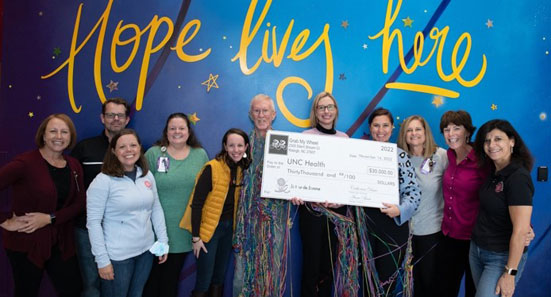
How the Angel Fund works
Patient needs are assessed by medical social workers as part of the care plan. Medicaid eligibility, job loss, and lack of insurance are taken into account. Patients who, at the start, have insurance and stable income may experience a financial decline and need assistance to complete their treatment. UNC Health social workers are available to assess those challenges.
Social workers also help patients identify additional sources of assistance in addition to the Angel Fund. These may include family, friends and community resources such as food banks, Meals on Wheels, and the Caring Community Foundation. Patients are also directed to appropriate government programs.
The Angel Fund at work...
“Instead of being killed by cancer, I was renewed by it.” Gintas Abarius’s infectious enthusiasm and zest for life would make him an ideal namesake for one of the programs that helped save his life. It’s called the Angel Fund.
Gintas is a concert pianist who was working as music director of a church in Raleigh. The native of Lithouania spent a lot of time abroad playing concerts. But his career came to an abrupt halt when a tumor the size of a grapefruit in his throat and face stopped him from singing, speaking, and even at times, breathing. Health insurance wasn’t part of Gintas benefits package at work, but even if it was, he was forced to stop working because of the severity of his condition. Gintas went to work anyway, except that the nature of his work changed. The objective now was to live.
When doctors diagnosed Gintas with throat cancer, he was given a 48 percent chance of survival. “Physically I hurt. But spiritually, emotionally—I refused to envision a funeral.” He firmly believed that people with a much worse prognosis had survived. For that reason he considered himself lucky. Gintas immediately changed his diet. He surrounded himself with positive people, healthy food, and good music. He began to exercise. “What I fed my mind was as important as what I fed my body.” Gintas got into the best physical and spiritual shape of his life. He felt prepared to take the next and arguably, the most important step in his treatment: chemotherapy… however, the road block was a dollar sign. That’s where the Angel Fund came in.
The Angel fund is designed to serve patients undergoing cancer treatment, who as a result, find themselves facing financial crisis. Like Gintas, the fund most often benefits those patients who fall through the cracks because they fail to qualify for other programs. Last year UNC helped more than a hundred people through the Angel Fund. Although the Angel fund doesn’t cover treatment, it assists with all the incidentals ranging from help to pay for gas to get to/from treatments, to aid with rent, to support with the cost of prescriptions. With a little help from the Angel Fund, and a lot of charity from UNC Hospital, all of Gintas’s treatment including medication was covered. “I got superior medical service and financial help.” Gintas’s job as a music director was the primary source of income for himself, his wife, and his two children—one of them a highschooler, the other a Wake Tech college student. “Rex showed us the heart of the Lord.”
Gintas responded almost immediately to chemotherapy. At last check he was 98 percent clear of cancer with radiation treatment still to follow. His hair is growing back. He sang in eight church services within a five-day span during the holiday season. All of it evidence that the strength of his health is catching up with that of his spirit. “What I learned is that there is no death for hope. I am a living witness to a loving community.”

